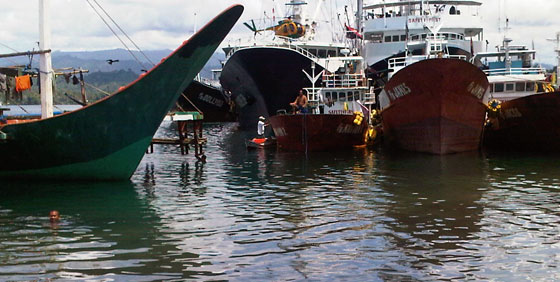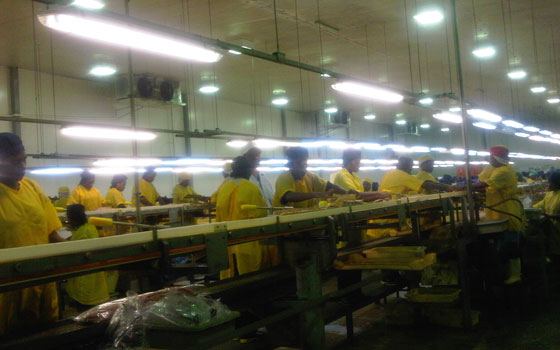

Deadly catch
Hazards issue 116, October-December 2011
It was no surprise to see the fishing industry topping the 2011 listing of the most deadly US jobs. If you worked in fishing, the chances were more than 1 in a 1,000 you didn’t survive the year. ‘Update of mortality for workers in the UK merchant shipping and fishing sectors’, a 2007 Swansea University study for the UK government, found the UK fishing industry had a similar fatality rate, again over 1 in a 1,000 - or over 100 times the rate for all UK jobs.
The report noted: “There has been no discernible reduction in the fatal accident rate in the UK fishing industry in the last 30 years. As the fatal accident rates in the general British workforce and in almost all other occupations have fallen sharply during the same time period, in relative terms, commercial fishing has become progressively more hazardous over time.”
The situation in less well-regulated fleets is significantly worse, according to United Nations agencies the Food and Agriculture Organisation (FAO) and the International Labour Organisation (ILO), whose September 2010 fishing health and safety handbook notes “in many countries, fishing is the most hazardous occupation.”
Tackling this fishing industry carnage is a top priority for global union federations ITF and IUF. Their new ‘From Catcher to Counter’ programme aims to build worker representation and is designed to cover the whole industry from ‘catcher to counter’ and to increase union membership and power. It will also seek to standardise and improve conditions across multinational companies. The global union federations want to “establish process to assure that fishing is not illegal, unregulated and unreported.”
Ron Oswald, general secretary of food sector global union federation IUF, explained: “The fishing industry is vast, vital, but often unregulated. Fishing is one of the world’s most dangerous occupations, something that has been vividly underlined by the recent release of casualty figures from the International Maritime Organisation (IMO), which estimates the annual death toll among fishers as a chilling 24,000 per year.” In October 2011, IMO – a part of the United Nations - said these deaths amounted to “a most deplorable record indeed,” adding it “recognised the need for a response to the safety crisis.”
Jon Whitlow, seafarers’ section secretary of the global transport unions’ federation ITF, said unions would be pressing for that response. He said ITF wanted authorities in all countries with sizeable fishing fleets to take action “to improve working and living conditions on board fishing vessels, including through full consideration and implementation of the recently adopted International Labour Organisation (ILO) Work in Fishing Convention No 188, 2007.” [more]. The convention’s provisions include requiring that workers in the sector have access to occupational health and safety and medical care and to protection from excessive working hours.
Liz Blackshaw, the ITF/IUF fisheries programme leader, commented: “The starting point for this important new joint effort is to gauge the depth of union coverage across this whole industry. That information is essential for us to develop an organising plan for the industry, and we’re asking ITF- and IUF-affiliated unions to help us find it.”
 She continued: “The need for representation and protection for fishers is being shown right now in New Zealand, where ITF unions have pushed the government into declaring a ministerial inquiry into the often scandalous conditions in which many foreign fishers have been made to work.”
She continued: “The need for representation and protection for fishers is being shown right now in New Zealand, where ITF unions have pushed the government into declaring a ministerial inquiry into the often scandalous conditions in which many foreign fishers have been made to work.”
Further information
ITF/IUF ‘From Catcher to Counter’ campaign.
New Zealand abuses highlight global problem
A call for a complete overhaul of the way the fishing industry is regulated in New Zealand and beyond is being backed by the global transport workers’ union federation ITF.
Unions in the country have been pushing for action following the case of the Oyang 75, a Korean fishing vessel abandoned in Lyttleton, New Zealand, with the Indonesian crew claiming underpayment and physical and verbal abuse. Twenty six charges against Korean officers have resulted from an investigation by the New Zealand ministry of fisheries into the case. The ministry said it is possible “the Oyang 75 may become forfeit to the New Zealand government.” Reports say the ship was chartered by Christchurch based Southern Storm Fishing, the same company who chartered the Oyang 70 which sank off the coast of New Zealand in 2010, killing six crew members.

UNION CAUSE
A waterfront member of the Maritime Union Of New Zealand (MUNZ) spotted this crew member aboard a chartered foreign fishing vessel. In July 2011, the NZ government acceded to the union’s demand and launched a ministerial inquiry into the conditions facing foreign fishers.
An official inquiry into the foreign charter of vessels in the New Zealand fishing industry began on 17 October 2011. The inquiry followed pressure from the Maritime Union of New Zealand (MUNZ), which said foreign fishers toiling in New Zealand waters were subjected to poor safety and working conditions.
MUNZ general secretary Joe Fleetwood had charged that the existing regulation of the New Zealand fishing industry and joint venture operators using international crews had been shown up as a failure. “It is time to lance this boil. There needs to be a thorough investigation of the industry and immediate concrete steps, not just talk, to clamp down on the abuse and exploitation of overseas crews in New Zealand waters.”
Mr Fleetwood said MUNZ would make sure the ministerial inquiry is not just a “smother job” that sits on the bookshelf gathering dust. “This must not be a box ticking exercise. We know what the problems are, what we need now is action, proper regulation, proper enforcement, to clean up a mess that has been allowed to grow for years under successive governments.”
Indonesian crew members who worked on fishing boats on New Zealand waters say they faced months of abuse and were called names like "monkey" and "pigs". The issue came to a head when three Indonesian crew members were killed after the Korean-registered fishing ship Oyang 70 capsized and sank 800km southeast of Dunedin in 2010.
Jon Whitlow, ITF seafarers’ section secretary, commented: “We support our New Zealand affiliates in their efforts to bring about a change in fisheries regulations. But we believe it is not just New Zealand authorities that need to act. The authorities of other countries with sizeable fishing fleets should also take appropriate action to improve working and living conditions on board fishing vessels, including through full consideration and implementation of the recently adopted International Labour Organisation (ILO) Work in Fishing Convention No 188, 2007.”
The convention calls for workers in the sector to have access to occupational health and safety and medical care and to have protection from excessive working hours.

DIRTY JOB A waterfront member of the Maritime Union Of New Zealand (MUNZ) spotted this crew member aboard a chartered foreign fishing vessel. In July 2011, the NZ government acceded to the union’s demand and launched a ministerial inquiry into the conditions facing foreign fishers.

FLOATING HAZARDS When things go wrong onboard, workers like these in Thailand have to be able to undertake urgent engineering and repair work, often at sea and in hostile conditions.

GUTTED In the gloom of an Asia Pacific region fish processing plant, a precariously positioned worker shovels fish guts into the industrial grinder below.

FISHY The company running the Asia Pacific region fish processing plant did not provide the workers processing the fish with protective clothing. The cost of the essential safety gear they are wearing was deducted from their wages, so they didn’t get paid for four weeks.

SEA RESCUE The trawler Achieve had to be rescued by an RNLI lifeboat after suffering steering failure in gale force conditions. Another fishing boat had attempted to tow the striken vessel, but failed to make any headway in the high seas.
Deadly catch
Two global union bodies have joined forces to fight for safety in the treacherous fishing industry.
Related story
New Zealand abuses highlight global problem more

Click on images for larger versions
Hazards webpages
Working world • Deadly business




